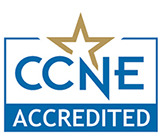Bachelor of Science in Nursing
Professional nurses must be prepared to meet the challenges of highly complex health care needs and services for people of our diverse communities. The baccalaureate nursing program emphasizes health promotion, coordinating cost-effective quality care, community-focused health care, and evidence-based practice.
Accreditation
The baccalaureate degree programs in nursing, master’s degree programs in nursing, and post-graduate certificate programs in nursing at SUNY Polytechnic Institute are registered by the New York State Education Department and are accredited by the Commission on Collegiate Nursing Education, 655 K Street, NW, Suite 750, Washington, DC 20001, 202-887-6791. For more information, see: www.aacnnursing.org/CCNE.
Vision
The nursing community at SUNY Polytechnic Institute aspires to be a values-based center of nursing excellence for learners and professionals regionally, nationally, and internationally. We are dedicated to contributing to society by advancing nursing scholarship and practice through innovation, technology, collaboration, and caring.
Mission Statement
The mission of the nursing community at SUNY Polytechnic Institute is to promote a caring, transformational learning environment through academic excellence, lifelong scholarship, and innovation in nursing. We provide quality, evidence-based nursing education that prepares learners to meet diverse healthcare needs within our local and global communities through technology, leadership and collaboration.
Undergraduate Student Learning Outcomes
At the completion of the baccalaureate program, the life-long learner will be able to:
- Synthesize theoretical and empirical knowledge in nursing and from related arts, sciences, and technology essential for professional practice.
- Apply theories of caring, health promotion, leadership, and management to meet health care needs of clients and families within culturally diverse communities.
- Integrate concepts of critical reflection, collaboration, and evidence-based practice through effective communication, to foster independent judgment and decision making in one’s practice.
- Engage in collaboration with clients, health care professional, and organizations to provide safe, high quality healthcare.
- Model nursing excellence and professionalism in all aspects of clinical practice with individuals, families, and communities.
- Cultivate values of caring, cultural diversity, altruism, social justice, advocacy, and ethical decision making in the provision of health services to clients.
- Exhibit principles of leadership to ethically, effectively and efficiently use resources for enhancing the practice environment and improving patient care outcomes.
- Apply principles of teaching and learning in health promotion, risk reduction, disease management, and rehabilitation activities for the improvement of health outcomes.
- Explore innovative approaches, as a change agent, to healthcare through research, continued professional development, and the application of technology.

